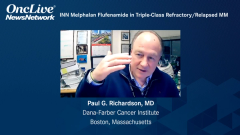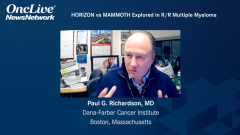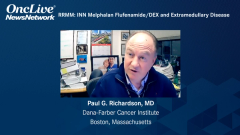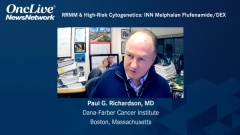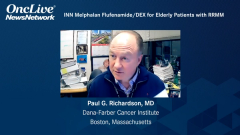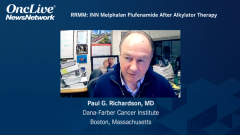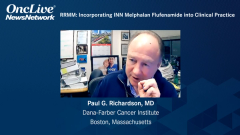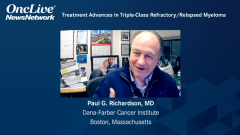
RRMM: INN Melphalan Flufenamide/DEX and Extramedullary Disease
Episodes in this series

Paul G. Richardson, MD: It is my pleasure to talk to you more about the subgroup analyses we did in HORIZON. One that is particularly important in the clinic is that of extramedullary disease. Extramedullary disease is classically characterized by a subclone of aggressive myeloma that thrive and grow independent of the bone marrow microenvironment. They’re classically enriched for poor-risk features, such as high-risk cytogenetics, increased proliferation, and invasion of apoptosis and resistant to all available treatments. This was very much the case in this particular group of patients.
When we looked at prognosis in patients such as this, they’re characteristically very poor. Importantly, in terms of activity of agents, proteasome inhibitors seem to be important, but so is CD38 monoclonal antibody therapy. In fact, if we look at the response of CD38-naïve patients with extramedullary disease, about 17% respond to the monoclonal antibodies of monotherapy. With that in mind, we looked at the 55 patients in the HORIZON trial. All were resistant to CD38 monoclonal antibody. Almost all were triple-class refractory. And very importantly, we saw a very solid response rate of around 24% in this group of patients.
In the particular subgroup of patients in this analysis, there was a highly durable response also seen, such that we concluded that Melflufen plus dexamethasone showed activity in advanced relapsed/refractory disease with extramedullary disease. We were encouraged by the progression-free survival and our overall survival that we saw. If we look at the subgroup and to the responding group of patients who achieved a PR [partial response] or better, we saw quite remarkable results. We saw that if you achieved a PR or better with Melflufen, the median progression-free survival was actually impressive at 17 months, and the median overall survival was 18.5 months. We were very encouraged by that. This was a small subgroup but really quite striking.
Conversely, however, if patients did not benefit from a response, their progression-free survival and overall survival was much shorter, suggesting that if you can derive benefit from this approach, you can do quite well. When we looked at the minimal responders, there’s a second subgroup. We were able to show the median duration of response was quite encouraging at 5.5 months, and this translates into a median progression-free survival of 8.5 months. And the median overall survival was also very encouraging at around 18 months. Conversely, in the patients with stable disease, the median duration of response was around 5.3 months with a median overall survival of 13.6 months. So there are really nice data from these particular subgroups.
If you want to look at the group overall, which is the sobering part of it, the median overall survival was overall 6.5 months, and the median progression-free survival was just 2.9. That tells you that in those patients who didn’t respond and their disease progressed, the outcomes were very poor. Clearly, we need to do more for extramedullary disease. But as a starting point, we felt we were quite encouraged by this early signal of—in those who responded—how long that response lasted for. That was a key message from this analysis.
Transcript Edited for Clarity


